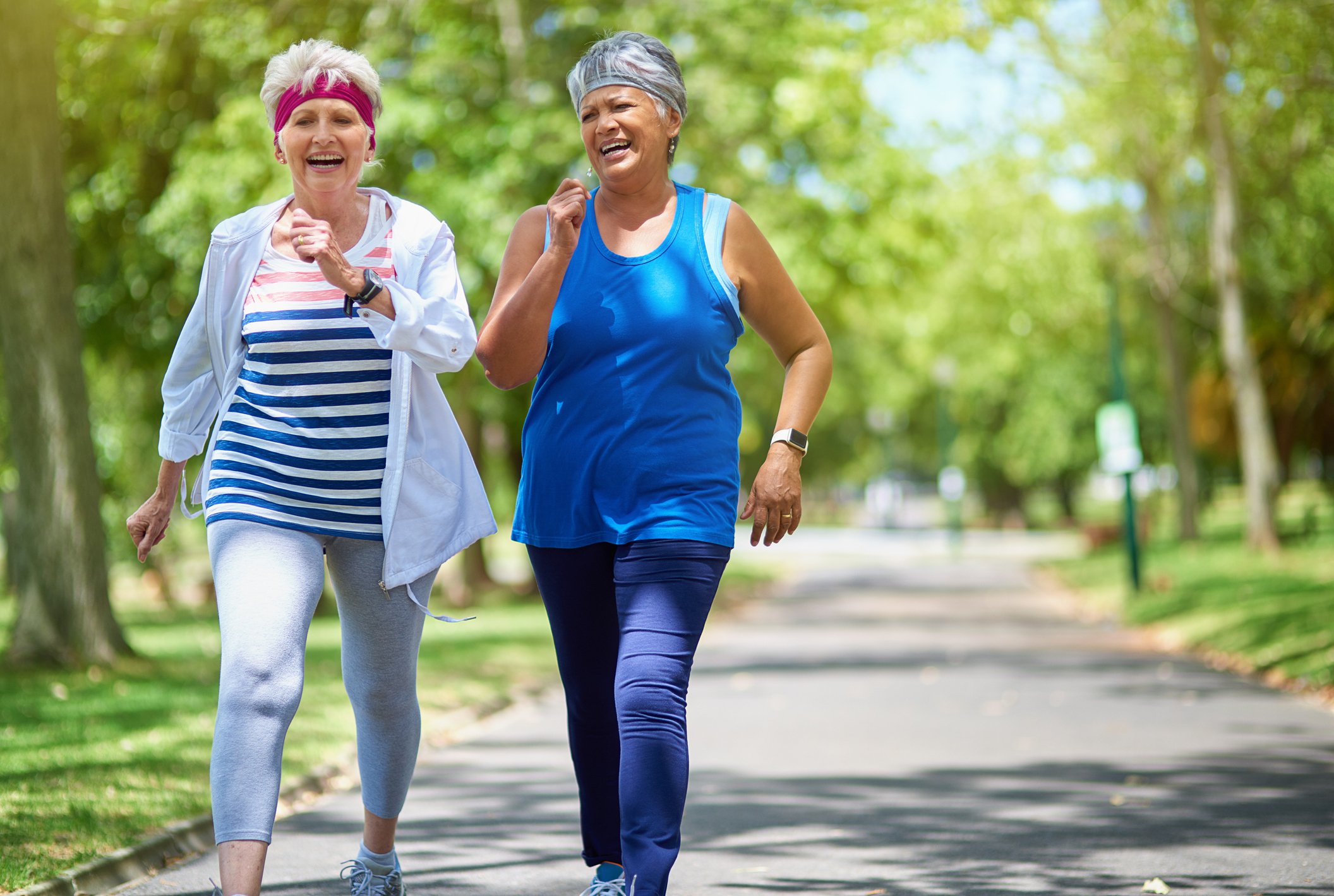
Walking is, for many seniors, a part of everyday living. A walk in the woods, a walk around town, a walk through the senior community, walking is an easy and even entertaining way to improve health and just enjoy a little screen-free time out. But for those who have yet to embrace the benefits of a daily walk for seniors in independent living, here are several great reasons to get moving!
Get your blood going
A brisk walk taken regularly is an easy way to increase blood flow and help prevent high blood pressure or minimize risk of HBP before it occurs. According to the Mayo Clinic, lowering high blood pressure requires about 150 minutes each week of exercise including “walking, jogging, cycling, swimming or dancing.” For seniors who don’t yet have HBP, walking can help avoid it all together as long as it is regular and consistent.
Senior Health Benefit: Improve balance and muscle strength
Maintaining muscle strength as we age is essential to overall health and wellbeing. Because walking is a weight-bearing exercise, it helps increase muscle strength which in turn supports bones and improves balance. The speed and distance of a walk, according to the Nurses’ Health Study, are also associated with lower risk of hip fracture in post-menopausal women. And, since falls are one of the most common and deadliest injuries to seniors, improving balance and strength can mean a longer, happier and more independent life. Find out more about balance and falls from the Centers for Disease Control and Prevention’s article, “Falls—and the injuries and deaths they cause—are increasing. Learn how you can prevent falls.”
Minimize joint pain
Being in pain can make even the most gung-ho exerciser want to take a few days off, but the truth is exercise can actually help while lack of exercise can make it worse. For those with arthritis, joint pain can be minimized by regular exercise, and even a walk around the block can be a benefit because it helps maintain muscles and other joint-supporting tissue. Learn more about the benefits of exercise in the Mayo Clinic’s article, “Exercise helps ease arthritis pain and stiffness.”
Burn calories
Like any exercise, walking will burn calories, help lose weight and aid in weight maintenance. So, the more you walk, the more weight you stand to lose. For those who think just walking won’t make much difference, consider that walking burns almost as many calories as running per mile but without the physical repercussions. For more about walking for weight loss, the Medical News Today article, “What to know about walking for weight loss,” can help make the most of every walk.
Lower blood sugar
Diabetes is a huge health problem among seniors, but it’s also one that can be reduced with a walk (or three). According to one study, blood sugar may be controlled best with a 15 minute walk after each meal, rather than with one 45 minute walk each day. This is because blood sugar is high after a meal, so inactivity at that time contributes to insulin resistance. Replacing inactivity with action can go a long way toward staving off diabetes, even for those who are prediabetic.
Boost the immune system
Since the beginning of the COVID-19 pandemic, there has been lots of attention paid to the diminished immune systems of seniors. At the same time, gyms were closed, people were isolated and group activities like yoga and other exercise classes ceased, even as research shows exercise can actually boost the immune system. But throughout the pandemic, there remains one way to boast everyone’s immune systems and that is by walking. Seniors can still walk every day and continue to reap the benefits while socially distancing and wearing a mask. Find out more about walking and the immune system in the article, “Walking Improves Immune System Health,” from Alternative Health Concepts.
Senior Can Improve Cognition
Walking is a great opportunity for mulling over problems and thinking through plans. But just taking that walk can actually help improve our ability to do both those things because it stimulates blood flow to the brain. The faster you walk, the more blood flows from the heart benefitting the brain and muscles. In addition, one study also shows the act of walking – putting the foot down on the ground — sends pressure waves that may also increase blood flow to the brain. Read more about the study in the Science News article, “How walking benefits the brain.”
Senior Health Benefit: Prevent Depression
Exercise and improved moods have long been tied together, but research now may link exercise, including walking, with decreased risk of depression as well. Wondering whether exercise inhibits depression or being depressed inhibits exercise, a researcher at Harvard’s T.H. Chan School of Public Health undertook a study that ultimately showed people who move more have a lower risk for depression. That movement includes everything from doing the dishes to walking to using a stair climber so that when combined, movement is key to keeping depression at bay and a smile on your face. More about the study can be found in the Harvard Health Publishing article, “More evidence that exercise can boost mood.”
Independent living resident’s at Ganton’s Countryside have ample opportunities to get the exercise they need, including walking indoors and outdoors in a safe, healthful environment. For more information about Countryside, please call Margaret Nagel at (517) 206-5000 or download our brochure to learn about our care levels, cost, and amenities.

